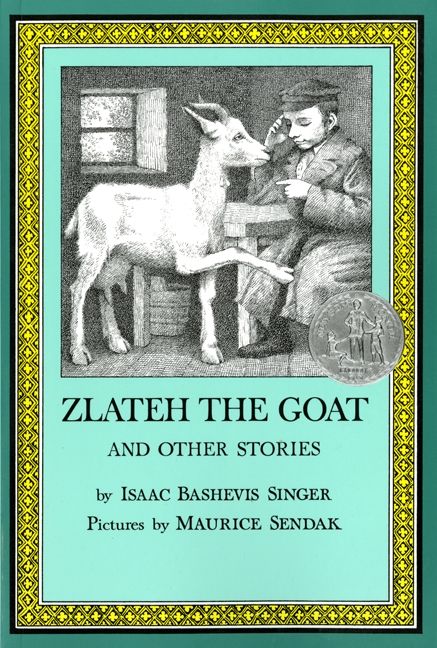| Long ago, in a far-away village lived a simple family with few resources. Shortly before Hanukkah, the mother and father realized they had no money to purchase potatoes or oil for the holiday. This is how Isaac Bashevis Singer’s “Zlateh the Goat” begins. It’s one of my favorite children’s stories. . . . |
I often reread it around this time of year, as the holiday season approaches. It’s a great reminder of how Jews celebrated Hanukkah before they came to America, and their holiday observance began competing with Christmas consumerism.
These days, as Hanukkah draws near, I find it nearly impossible to escape all the marketing messages – on the radio, in the malls, on the web, and even in the grocery stores – beckoning me to buy. My kids’ consumerist habits only make it worse. Sometimes I catch them combing through the shiny catalogs we’ve gotten in the mail, circling what they like, generating wish-lists, and hanging them up on the fridge. I have the urge to buy for them, to make them happy, and give them a feeling that they lack for nothing.
The family in I.B. Singer’s story gives me a healthy perspective. Here’s what happens to them: When they realize they can’t afford to purchase the things they need to celebrate Hanukkah, the father tells his son to take Zlateh – their beloved goat – to the butcher, who had offered to buy her for eight gulden. Reluctantly, Aaron puts Zlateh on a leash, and leaves the house. His sisters remain behind weeping, as they watch the pair head to town.
As it happens, Aaron encounters terrible trouble on the way, and through a serendipitous turn of events, Zlateh the goat saves him. When the two return home safe, the family decides that – despite their needs – they simply cannot sell her. In the meantime, another miracle occurs. The family fortune takes a turn, and they suddenly have enough to purchase everything they need for the holiday. They make potato latkes, they light the menorah, and play dreidel by the candles’ dancing flames – all with their goat Zlateh beside them.
This Hanukkah, as always, I know my children will be waiting to open their shiny wrapped presents. And I will oblige. At least on most nights. But I’ll also set aside a few nights without presents and hope a Hanukkah miracle visits my family, just like the one in I.B. Singer’s story. I’ll read “Zlateh the Goat” to them, we’ll light the candles, play a few rounds of dreidel, eat potato pancakes. And we’ll realize – in spite of all the consumerist calls outside – that inside the warmth of our cozy home, we already have everything that we need.
You can read “Zlateh the Goat” here.
These days, as Hanukkah draws near, I find it nearly impossible to escape all the marketing messages – on the radio, in the malls, on the web, and even in the grocery stores – beckoning me to buy. My kids’ consumerist habits only make it worse. Sometimes I catch them combing through the shiny catalogs we’ve gotten in the mail, circling what they like, generating wish-lists, and hanging them up on the fridge. I have the urge to buy for them, to make them happy, and give them a feeling that they lack for nothing.
The family in I.B. Singer’s story gives me a healthy perspective. Here’s what happens to them: When they realize they can’t afford to purchase the things they need to celebrate Hanukkah, the father tells his son to take Zlateh – their beloved goat – to the butcher, who had offered to buy her for eight gulden. Reluctantly, Aaron puts Zlateh on a leash, and leaves the house. His sisters remain behind weeping, as they watch the pair head to town.
As it happens, Aaron encounters terrible trouble on the way, and through a serendipitous turn of events, Zlateh the goat saves him. When the two return home safe, the family decides that – despite their needs – they simply cannot sell her. In the meantime, another miracle occurs. The family fortune takes a turn, and they suddenly have enough to purchase everything they need for the holiday. They make potato latkes, they light the menorah, and play dreidel by the candles’ dancing flames – all with their goat Zlateh beside them.
This Hanukkah, as always, I know my children will be waiting to open their shiny wrapped presents. And I will oblige. At least on most nights. But I’ll also set aside a few nights without presents and hope a Hanukkah miracle visits my family, just like the one in I.B. Singer’s story. I’ll read “Zlateh the Goat” to them, we’ll light the candles, play a few rounds of dreidel, eat potato pancakes. And we’ll realize – in spite of all the consumerist calls outside – that inside the warmth of our cozy home, we already have everything that we need.
You can read “Zlateh the Goat” here.

 RSS Feed
RSS Feed
